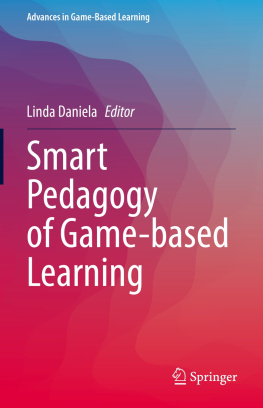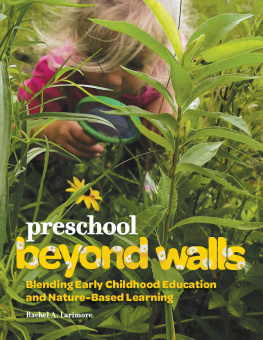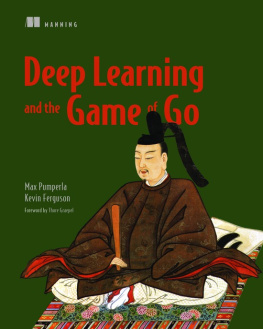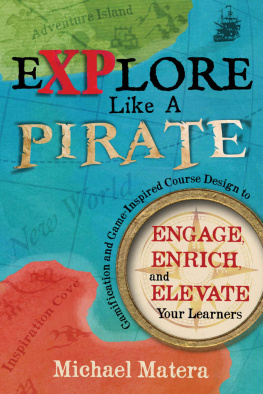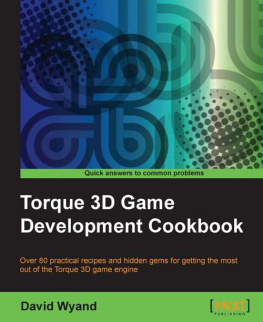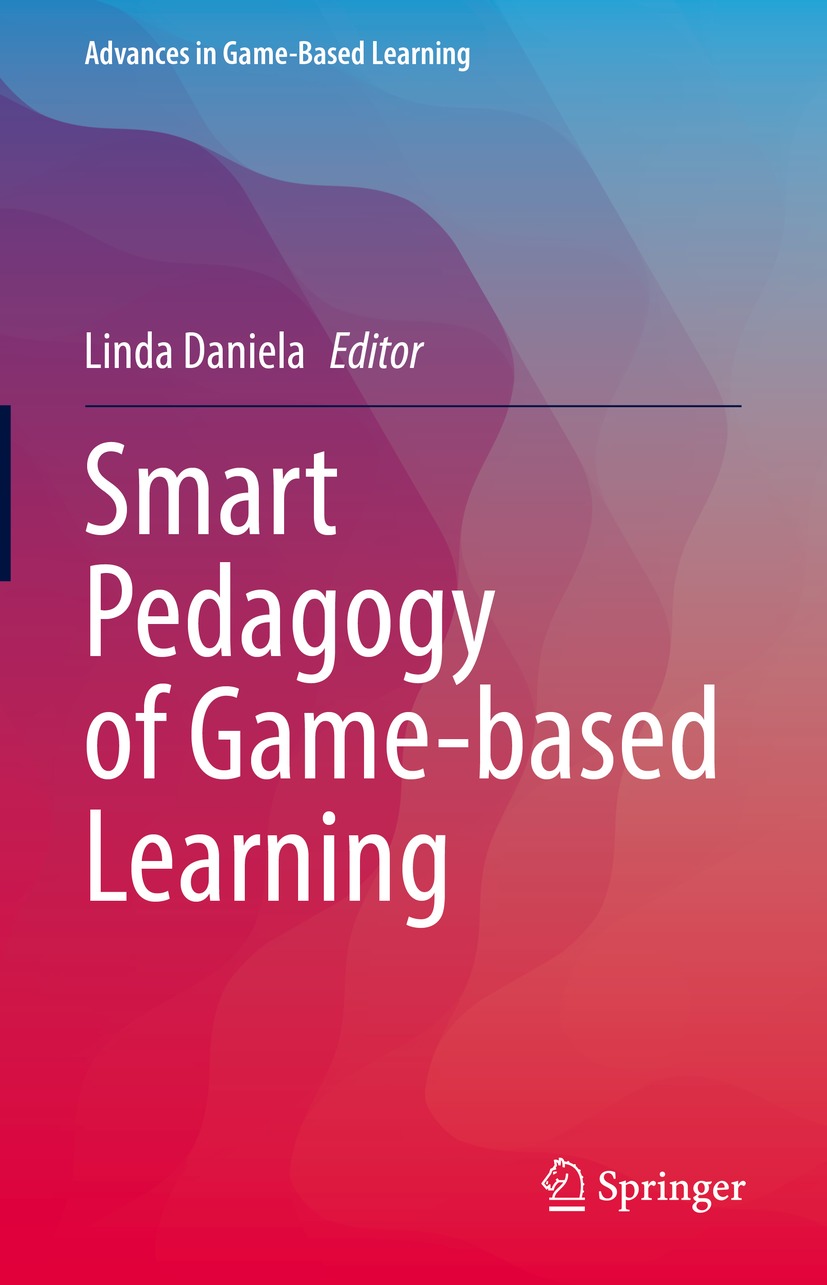Editor
Linda Daniela
Faculty of Education, Psychology and Art, University of Latvia, Riga, Latvia
ISSN 2567-8086 e-ISSN 2567-8485
Advances in Game-Based Learning
ISBN 978-3-030-76985-7 e-ISBN 978-3-030-76986-4
https://doi.org/10.1007/978-3-030-76986-4
The Editor(s) (if applicable) and The Author(s), under exclusive license to Springer Nature Switzerland AG 2021
This work is subject to copyright. All rights are solely and exclusively licensed by the Publisher, whether the whole or part of the material is concerned, specifically the rights of translation, reprinting, reuse of illustrations, recitation, broadcasting, reproduction on microfilms or in any other physical way, and transmission or information storage and retrieval, electronic adaptation, computer software, or by similar or dissimilar methodology now known or hereafter developed.
The use of general descriptive names, registered names, trademarks, service marks, etc. in this publication does not imply, even in the absence of a specific statement, that such names are exempt from the relevant protective laws and regulations and therefore free for general use.
The publisher, the authors and the editors are safe to assume that the advice and information in this book are believed to be true and accurate at the date of publication. Neither the publisher nor the authors or the editors give a warranty, expressed or implied, with respect to the material contained herein or for any errors or omissions that may have been made. The publisher remains neutral with regard to jurisdictional claims in published maps and institutional affiliations.
This Springer imprint is published by the registered company Springer Nature Switzerland AG
The registered company address is: Gewerbestrasse 11, 6330 Cham, Switzerland
Preface
Hopes for Game-Based Learning
To date, games have been used both to help children learn by playing, an idea that originated from Friedrich Frbels work, and to support adults in developing strategic skills such as through chess, bridge, Go and similar. Reiser (2001) considers that the use of games as an instructional method for educational purposes dates to after World War II, when instructional media, for example different vizualisations to let students better understand some concepts, began to be used in any sense for instructional delivery (Reiser & Gagne, 1983). It is believed that the idea of digital games originated between 1960 and 1970 (Jaiswal, 2021), and since 1971, when Intel introduced its microprocessor in Santa Clara, California (Chan et al., 2006), there has been a revolution in various digital solutions that also affected the use of games in education. During the late 1970s and early 1980s, digital educational games became an important constituent of student-centred learning (Marklund, 2015). In the research literature, the term game-based learning (GBL) is mostly referred to as digital game-based learning (DGBL) (Giannakas et al., 2018), but for simplicity the term GBL is used and digital games are proved more as motivational than educational (Chen & Hwang, 2014). Although there is potential for the use of games in education, they are still rarely used. Denham, Mayben and Boman (2016) think that the reason for this is that teachers are unprepared for using this method due to a lack of professional development in teacher training. In order for teachers to start using digital games in the teaching process, it is necessary to acquire technological, pedagogical and content knowledge on how to manage this process (Becker, 2007; Kirriemuir & McFarlane, 2004).
Kirriemuir and McFarlane (2004) have defined a game as a type of activity either where the gaming is a central element of the activity or where there are stimulating elements for other activities and where learning is a planned or accidental outcome of that activity.
Currently, the use of games can be divided into two large categories: entertainment games where accidental learning can take place and a purposefully organized game-based learning process that focuses on learning. In this book, we focus more on the fact that a game or elements of a game are purposefully used to strengthen one of the dimensions of knowledge (i) the perspective of knowledge growth; (ii) the perspective of knowledge acquisition and use; (iii) perspectives on knowledge accumulation; and (iv) perspectives of knowledge access (Daniela, 2020). If we look at these dimensions of knowledge from the perspective of game-based learning, different elements of the game come to the fore in each of them that combine with each other, but in the use of games, one must take into account not only the motivation of students, which can be promoted by games (Chen & Hwang, 2014; Burgos et al., 2013), but also what the digital game helps to achieve and where the teacher orchestrates all the elements of the games:
(i)
The perspective of knowledge growth in this case, when planning the game-based learning process, the focus should be on the fact that the main outcomes of using the game are an increase in students knowledge and the construction of new knowledge. If these are the main goals of game-based learning, then it is necessary to make sure that knowledge increases either by incorporating an assessment algorithm in the game itself that can provide teachers with information about the increase in knowledge or after the games to test knowledge using other assessment methods.
(ii)
The perspective of knowledge acquisition and use this is when the student acquires different types of knowledge during the game, but the main goal is not to prove the increase of knowledge but instead to use this knowledge both to analyse information differently and to use knowledge in different contexts. In this case, games can be used as a way for a student to acquire information, knowledge and competence in the use of knowledge. If this dimension is at the forefront of the educational process, then while the game may not include knowledge assessment elements, learning happens as a side effect of the game, which can be through either accidental learning or an intentionally set process, to gain a different perspective of thinking, for example to understand the historical or religious contexts that influenced the progress of certain processes.
(iii)
Perspectives on knowledge accumulation games can also be used as a learning method when knowledge accumulated in world history is included in them, for example about historical events that can no longer be repeated, knowledge of galaxies, which the student cannot access, or knowledge of objects that cannot be considered in detail. This may be a game about building the Great Wall of China or a game about the structure of a spaceship in which the student accumulates new knowledge in their existing knowledge schemes.
(iv)

